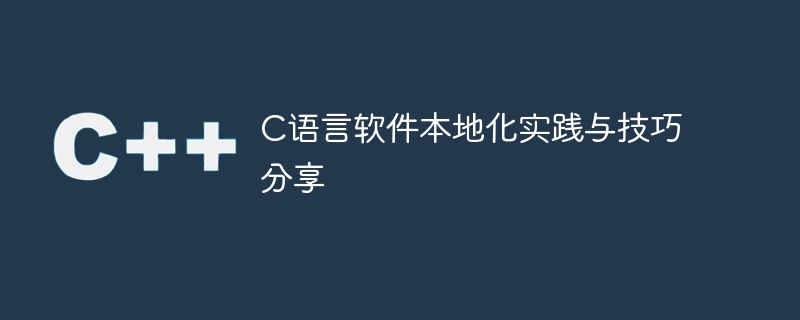

C language software localization practice and skill sharing
With the development of globalization, software localization has become more and more important. When developing C language software, how to achieve localization is an important issue that needs to be considered. This article will introduce the practical experience and skills of C language software localization, and provide specific code examples to help developers better perform software localization work.
1. Basic concepts of localization
First of all, we need to understand what software localization is. Software localization refers to adapting software to a specific target market, language and cultural environment so that users can use the software in their familiar language and cultural background. The key to realizing software localization is to localize text, date, time, numbers and other contents in the software so that the software can automatically adapt to different language and cultural environments.
2. Practice and skill sharing
In C language, strings are usually used to represent text information. In order to achieve multi-language support for the software, we can extract all text information in the software, store it in a separate language file, and load the corresponding language file according to the language selected by the user. Here's a simple example:
#include <stdio.h>
#include <stdlib.h>
char* getLocalizedString(char* key) {
// Get the corresponding localized string from the language file according to the key
return "Localized string";
}
int main() {
char* welcomeMsg = getLocalizedString("welcome_message");
printf("%s
", welcomeMsg);
return 0;
}Different regions may represent dates and times differently, so localization issues need to be considered when processing dates and times. C language provides some functions to obtain and process localized date and time information. For example, the strftime() function can format the date and time according to the localized format. Here's an example:
#include <stdio.h>
#include <time.h>
int main() {
time_t now;
struct tm *local_time;
char buffer[80];
time(&now);
local_time = localtime(&now);
strftime(buffer, 80, "%x %X", local_time);
printf("Local time: %s
", buffer);
return 0;
}In different regions, numbers are represented differently, such as decimal points, thousand separators, etc. In C language, we can use the printf() function to control the formatted output of numbers. Here's an example:
#include <stdio.h>
#include <locale.h>
int main() {
double number = 1234567.89;
setlocale(LC_NUMERIC, "en_US");
printf("English format: %'.2f
", number);
setlocale(LC_NUMERIC, "fr_FR");
printf("French format: %'.2f
", number);
return 0;
}The above is a sharing of some practical experiences and techniques for localizing C language software. By properly processing text, date, time, numbers, etc., we can localize the software and improve the user experience. I hope this content can help developers who need to localize software.
The above is the detailed content of C language software localization practice and skills sharing. For more information, please follow other related articles on the PHP Chinese website!




